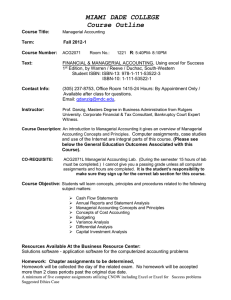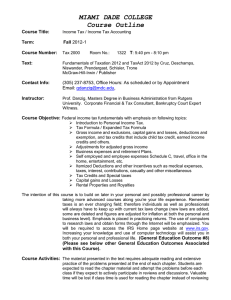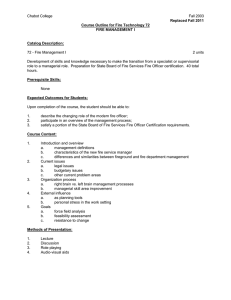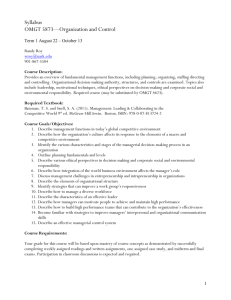MIAMI DADE COLLEGE Course Outline
advertisement
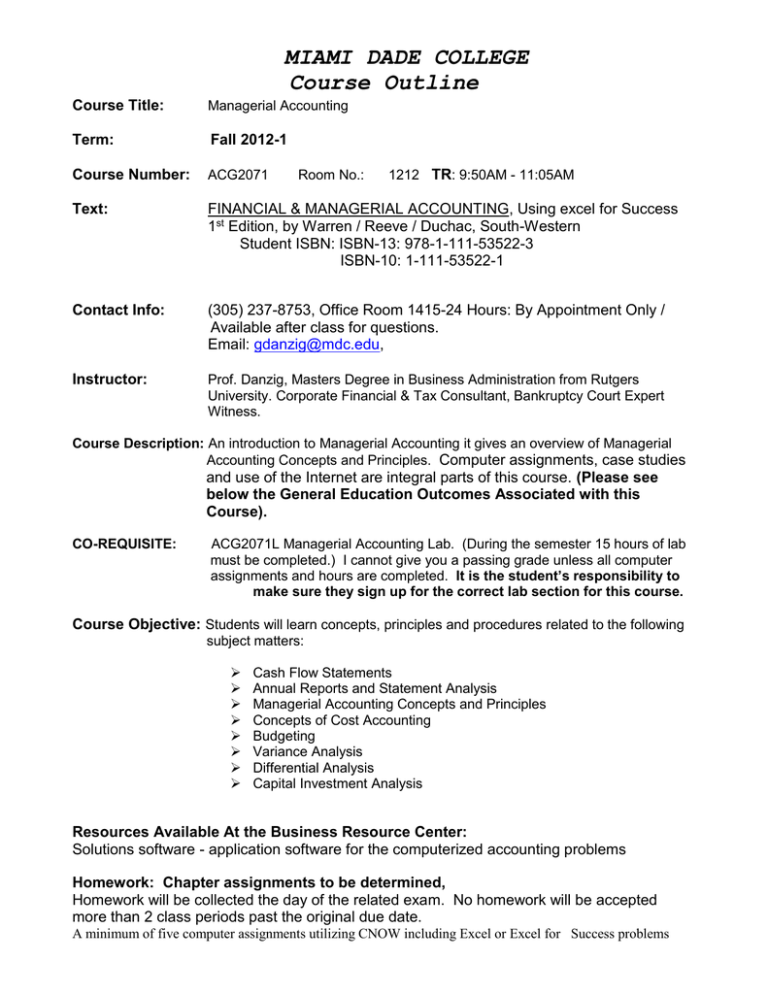
MIAMI DADE COLLEGE Course Outline Course Title: Managerial Accounting Term: Fall 2012-1 Course Number: ACG2071 Text: FINANCIAL & MANAGERIAL ACCOUNTING, Using excel for Success 1st Edition, by Warren / Reeve / Duchac, South-Western Student ISBN: ISBN-13: 978-1-111-53522-3 ISBN-10: 1-111-53522-1 Contact Info: (305) 237-8753, Office Room 1415-24 Hours: By Appointment Only / Available after class for questions. Email: gdanzig@mdc.edu, Instructor: Prof. Danzig, Masters Degree in Business Administration from Rutgers University. Corporate Financial & Tax Consultant, Bankruptcy Court Expert Witness. Room No.: 1212 TR: 9:50AM - 11:05AM Course Description: An introduction to Managerial Accounting it gives an overview of Managerial Accounting Concepts and Principles. Computer assignments, case studies and use of the Internet are integral parts of this course. (Please see below the General Education Outcomes Associated with this Course). CO-REQUISITE: ACG2071L Managerial Accounting Lab. (During the semester 15 hours of lab must be completed.) I cannot give you a passing grade unless all computer assignments and hours are completed. It is the student’s responsibility to make sure they sign up for the correct lab section for this course. Course Objective: Students will learn concepts, principles and procedures related to the following subject matters: Cash Flow Statements Annual Reports and Statement Analysis Managerial Accounting Concepts and Principles Concepts of Cost Accounting Budgeting Variance Analysis Differential Analysis Capital Investment Analysis Resources Available At the Business Resource Center: Solutions software - application software for the computerized accounting problems Homework: Chapter assignments to be determined, Homework will be collected the day of the related exam. No homework will be accepted more than 2 class periods past the original due date. A minimum of five computer assignments utilizing CNOW including Excel or Excel for Success problems Suggested Ethics Case In case of absences, it is the student’s responsibility to find out what homework has been assigned for the day he or she returns to class. In other words, even if you miss a class, you are still responsible for all assignments. Article: You are required to find a current article (using the internet) dealing with any topic covered in this course. Identify the web site in which you found your article and write a one page summary of the article. The summary must be done using a computer. You will need to turn in your summary, a copy of the article, and a cover sheet. Grading Criteria: 80%-of your grade is based on the average of three tests during the term and one final exam at the end of the term. The final is required. Your lowest grade among the three regular tests will be drop. If you miss a test, that will be your lowest grade. 20%-of your grade is based on class participation, homework and attendance and attitude. Grading Scale: 90% - 100% = A, 80% - 89% = B, 70% - 79% = C, 60% - 69% = D 0% - 59% = F Classroom Policy: No late work will be accepted. No food or drink permitted in the classroom. Use of cellular phones and beepers not permitted in the classroom. Class Attendance: Students are expected to attend all classes. An excused absence will require prior notification along with proper documentation. It is the student's responsibility to drop or withdraw this course. If a student misses more than 50% of the classes; their final grade will be lowered by a full letter grade. Academic Dishonesty: Academic Dishonesty is defined as an action inconsistent with the ethical standards of Miami Dade College. Academic dishonesty includes the following actions, as well as other similar conduct aimed at making false representation with respect to a student’s academic performance. The following are some examples of Academic Dishonesty: A) Cheating on an examination. B) Collaborating with others in work to be presented, if contrary to the stated rules of the course. C) Plagiarizing, including the submission of others ideas, work or papers (whether purchased, borrowed, or otherwise obtained) as one’s own. D) Submitting, if contrary to the rules of a course, work previously presented in another course. E) Knowingly and intentionally assisting another student in any of the above actions, including assistance in arrangement whereby any work, classroom performance, examination, or other activity is submitted or performed by a person other than the student under whose name the work is submitted or performed. General Education Outcomes: 1) Communication – An open line of communication is critical in all areas of your life; whether school, work or home. The only “bad” question is the one you do not ask. 2) Numbers/Data Analysis - Whether you realize it or not, numbers are everywhere-from the calorie content of your favorite soda, to the popularity polls of presidential candidates. All students should be able to process, understand and accurately analyze numerical data. 3) Creative/ Critical Thinking – In the business world one must be able to analyze the numbers or general information you working with to project budgets and sales for future periods. 4) Information Literacy - Do you consider "Wikipedia a primary source of information? By the time you graduate, you'll know the pros and cons of information in internet resources and be able to rate information sources based on their relevance and accuracy. 5) Global, Cultural, & Historical Perspectives – For a business to be successful it must be able to look at financial projections and understand what outside influences there might be. Knowing that a products success can be affected by the aforementioned categories gives a business a head start on fulfilling a customers’ needs and wants. 6) Social Responsibility - John Donne said, "No man is an island." Everything you do and say has an impact on those around you. While at MDC, you'll develop skills to fulfill not only your personal responsibilities, but also your roles as a citizen and member of a global community. 7) Ethical Thinking & Social Responsibility - It is not just a matter of how you interact with other individuals; but it also is how you act ethically and morally in a business situation. You must consider what the “best” overall is; this may not necessarily be what is the best for only yourself. 8) Computer / Technology Usage -You can probably surf the net and send e-mails already, but there are many other powerful tools at your fingertips. Before you graduate, you will learn how to use word processing, spreadsheet, database, and presentation programs. Class Schedule Week 1 Course Introduction Chapter 16 Week 2 Chapter 17 Week 3 Chapter 18 Exam 1 Week 4 Chapter 19 Week 5 Chapter 20 Week 6 Chapter 21 Exam 2 Week 7 Chapter 22 Week 8 Chapter 24 Week 9 Chapter 25 Week10 Chapter 26 Exam 3 Week 11 Week 12 Chapter 12 (Presentations) Chapter 14 Week 13 Chapter 20 Week 14 Chapter 23 Week 15 Chapter 27 Week 16 Internet Projects FINALS WEEK Required Final COURSE OUTLINE SUBJECT TO CHANGE AS NEEDED!
